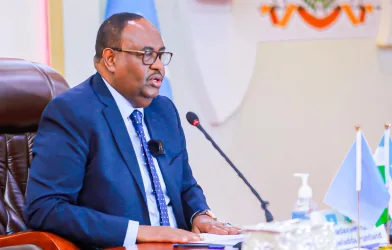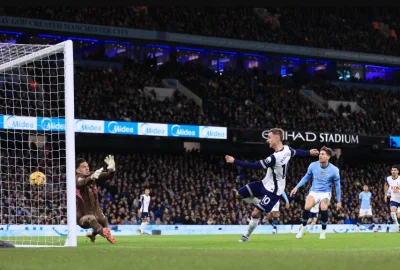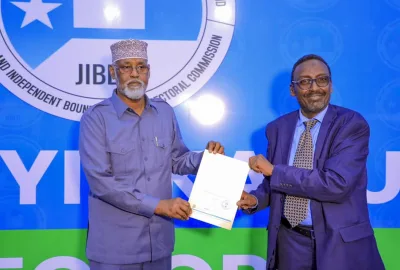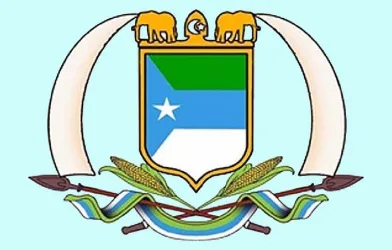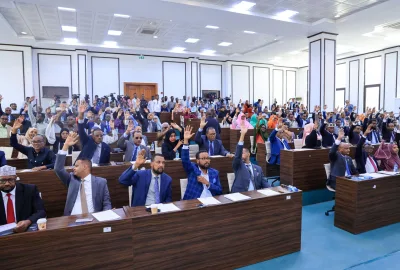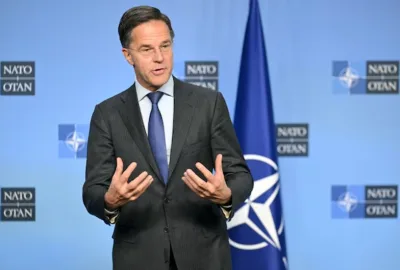It is public knowledge in Somalia that President Hassan Sheikh Mohamud has already racked up a…
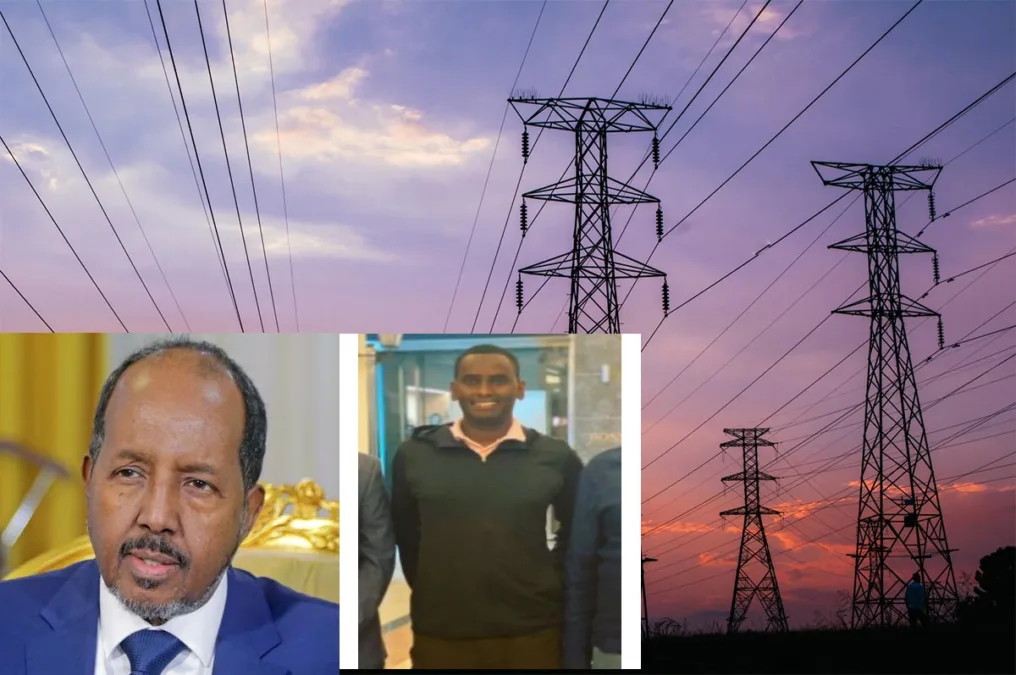
It is public knowledge in Somalia that President Hassan Sheikh Mohamud has already racked up a catalogue of unscrupulous activities in his less-than-year-old administration. Most of these corrupt practices are mainly in the control of the government, such as the leasing of prime public property to associates, shady nepotism aviation-related awards, and logistic and rations contracts – not a day goes by in Mogadishu’s coffee shops without someone detailing the latest exploit by the family and cronies of the President. However, few of these corrupt practices involve the complicity of otherwise reputable international organisations. One significantly poignant case involves one of the World Bank’s major projects in Somalia.
Soon as President Hassan Sheikh Mohamud’s government took over in May 2022, he and his operatives set their eyes and profiled World Bank projects in the country. The plan was to install clansmen or henchmen at the helm of all projects. One of the most attractive projects was the World Bank’s soon-to-be-approved Somalia Electricity Recovery Project, worth US$150m. A close clansman who contributed to the campaign had been identified, but the problem was that there was already someone who had been competitively recruited, Abdisalam Mohamud, the then Project Coordinator. The President had directly ordered the removal of Abdisalam, mainly on the bases of his distant clan association with the former President, Farmaajo. The story of how the President used his power to unduly force out an innocent citizen from a technical non-political position shamelessly and unethically is currently an open secret in Somalia and one that will be remembered for generations to come. Sources privy to the intrigue informed us that despite Abdisalam’s eagerness to continue the role, he felt it was untenable given the administration’s undue demands, threats and intimidation. In early November 2022, he tendered his resignation under duress, and on his last date at the job, 4 December 2022, he posted the below statement on Twitter:
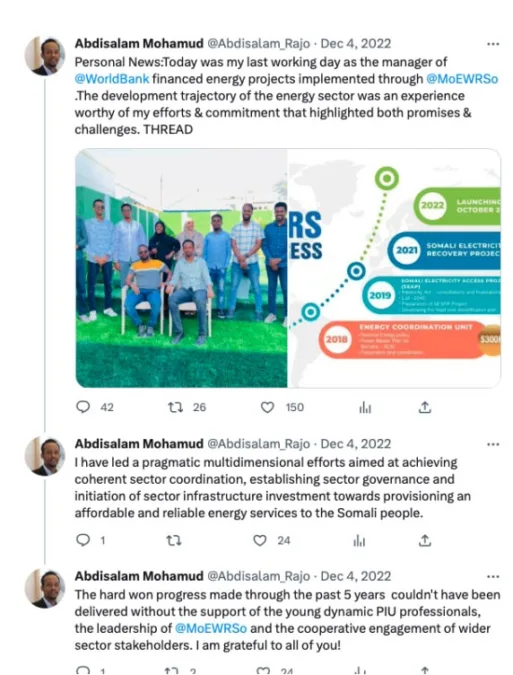
But the most vexing issue now is the controversial profile of the man nominated by the President to replace Abdisalam and the complicity of the World Bank to comply with the President’s bidding. His name is Adam Abdulle Omar, a Minnesota-based famous for being extremely critical of the Farmaajo Administration and a troller with the vilest, most offensive and most provocative posts. Anyone who has been following Somalia in the past five years is familiar with this character, particularly his sweeping hate-filled attacks on certain clans. Aware of the caustic nature of posts and comments, Adam first deleted his Twitter posts since applying for the critical position and has now completely deactivated his infamous account.
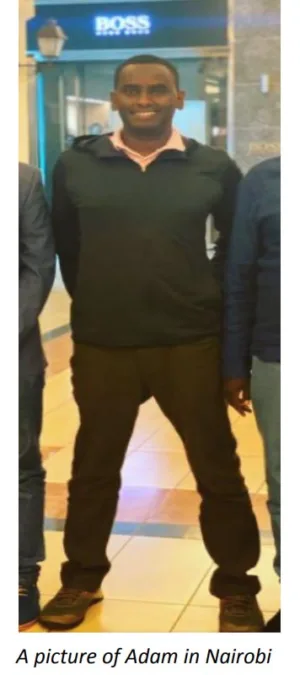
One can only assume that Adam has filled his CV with a non-existent decorative experience akin to the impostor congressman George Santos. People who know him in the US that we have spoken to confirm that Adam Abdulle has neither the education nor the experience background required to lead such a complex technical project and that he has never held a professional job, let alone a managerial position. Adam’s political alignment with the President and contribution to Farmaajo’s opposition via Twitter trolling is not the primary reason why he has been handpicked for the World Bank project role. The US-sanctioned businessman Abdinasir Ali Adoon, who bankrolled the President’s campaign, and now acts as Villa Somalia’s main money and business operator, is spearheading this fraudulent attempt, among others. Furthermore, Adam is also very close kin of the President and Mr Adoon.
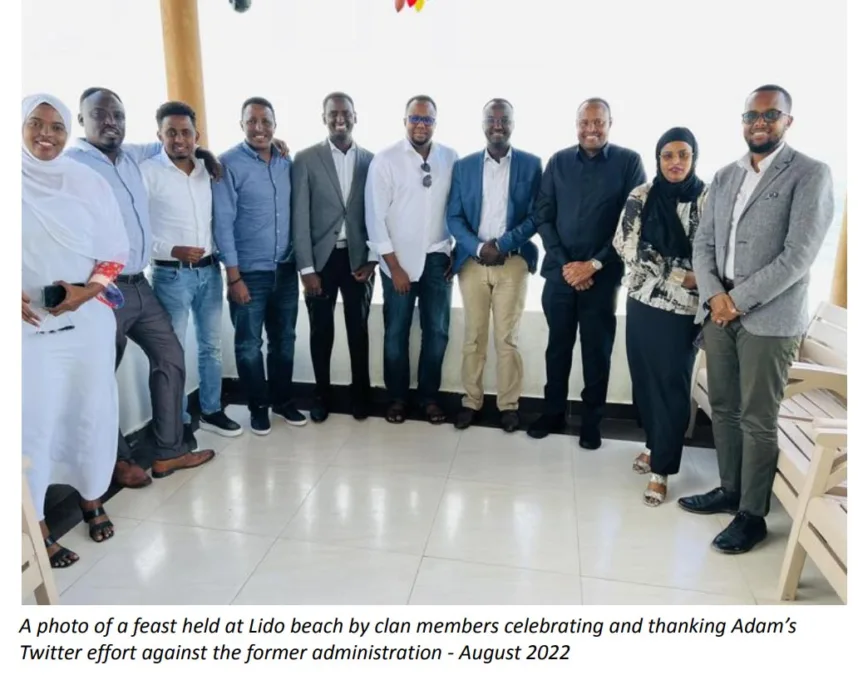
World Bank programs have been the center of the reconstruction efforts of Somalia. The Bank’s development projects are typically managed through transparency and rigorous fiduciary oversight. In contrast to these norms, President Hassan Sheikh has been aggressively trying, and succeeding in some cases, to install his clansmen as the head of all development projects in pursuit of short-economical gains. It is essential to understand how the World Bank is being lax on its standards at the risk of its reputation, and the impact of these projects.
When the former project coordinator was removed by force, the government turned its attention to tailoring the Terms of Reference (ToR) for the Coordinator to fit Adam’s qualifications and experience. The Minister of Energy and Water Resources, Jama Taqal, and the World Bank team have conspired to lax the terms and tailor the qualification and experience requirements to suit the preferred candidate of Villa Somalia to succeed in the ongoing recruitment process. The post was advertised with the doctored ToR in early February 2023, and we understand Adam has conveniently applied for the position and is due to be shortlisted.
The most concerning issue is the complicity of the World Bank in the president’s efforts to install his closest clansmen in critical positions, as evidenced by the controversial proposal of Adam Abdulle Omar to head the World Bank’s Somalia Electricity Recovery Project. This raises serious questions about the World Bank’s standards and the efficacy of its fiduciary oversight. The bank’s reputation is at stake, given that it is a reputable international organization that is expected to uphold transparency and integrity in its development projects. The fact that the bank has allegedly conspired with the Somali government to tailor the qualifications and experience required for the position to suit the preferred candidate of Villa Somalia is a worrying sign. The upholding of high standards by international partners such as the World Bank is the best hope most Somalis have against Hassan Sheikh’s rapidly growing transgressions.
The impact of such fraudulent attempts on World Bank projects in Somalia could be significant. Corruption undermines development efforts, and it is essential to ensure that development projects are implemented with transparency and accountability. Therefore, the World Bank needs to take swift action to investigate these allegations thoroughly and ensure that its standards are upheld. Additionally, it is vital to hold those involved in corrupt practices accountable to deter others from engaging in similar conduct in the future.
We commit to providing a thread on the complaint and grievance mechanism of the World Bank to any candidate who is affected by the unfair recruitment process. It is crucial to ensure that those who have been wronged have access to a fair and transparent process to voice their concerns and seek redress.
Corruption undermines development efforts and has a devastating impact on the people who rely on these projects. Therefore, it is essential to hold those involved in corrupt practices accountable to deter others from engaging in similar conduct in the future. We urge the World Bank to take all necessary steps to address these allegations and uphold its reputation as a trusted partner in Somalia’s reconstruction efforts.
By Abdullahi M. Sudi
Abdullahi Sudi is governance and anti-corruption specialist, experienced in qualitative research, policy analysis and training in both civil society and academic settings. He works promoting transparency and accountability in government and civil society, and for promoting more equitable and effective policy outcomes, you can reach him suudi8718@gmail.com


